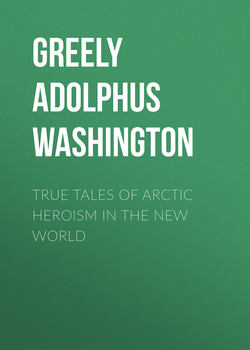Читать книгу True Tales of Arctic Heroism in the New World - Greely Adolphus Washington - Страница 7
KANE'S RESCUE OF HIS FREEZING SHIPMATES
Оглавление"Men in no particular approach so nearly to the gods as by giving safety to their fellow-men." – Cicero.
In 1853 the United States co-operated a second time in the search for Sir John Franklin, and sent into Smith Sound an expedition fitted out through the liberality of Henry Grinnell and George Peabody. Doctor Elisha Kent Kane, United States Navy, commanded the expedition, and placed his brig Advance in winter quarters in Rensselaer Harbor, West Greenland, whence he planned by boats and sledges to "examine the coast lines for vestiges of the lost (Franklin's) party." This sketch relates particularly to Kane's personal and heroic endeavors to save from death one of his own field parties.
Among arctic explorers there is no more striking and interesting figure than that of Elisha Kent Kane, whose enthusiasm created and individuality dominated the search of 1853. Well-intended, his expedition was fallacious in plan, unsuitably equipped, inadequately supplied, and manned by inexperienced volunteers. It seemed doomed to utter and dismal failure, yet through the activities of the versatile leader its general results exceeded those of any other arctic expedition of his generation. With a literary charm and a beauty of expression unexcelled by any other polar explorer, Kane revealed to the world the human relations and racial qualities of the Etah Eskimo, told of the plant and animal life of that desolate region, recorded the march of physical forces, and outlined the safe and practicable route whereby alone the north pole has been reached. But if his mind was imbued with a spirit of philosophy, and if his poetic vision saw first the beautiful, yet his sense of duty and strength of will inevitably involved his exposure to any and all privations that promised definite results.
The autumnal journeys of 1853 had led to nothing promising in the neighborhood of the Advance, so throughout the winter he was busy in preparing for the spring sledge trips in order to search the northern coast line for the lost explorers. Thus planning and laboring he definitely recognizes the unfavorable situation. "The death of my dogs, fifty-seven in all, the rugged obstacles of the ice, and the intense cold (the temperature had fallen to one hundred degrees below the freezing-point) have obliged me to reorganize our whole equipment. We have had to discard all our India-rubber fancy-work. Canvas shoemaking, fur-socking, sewing, carpentering are all going on. Pemmican cases are thawing, buffalo robes drying, camp equipments are in the corners." He adds: "The scurvy spots that mottled our faces made it plain that we were all unfit for arduous travel on foot at the intense temperatures of the nominal spring. But I felt that our work was unfinished.
